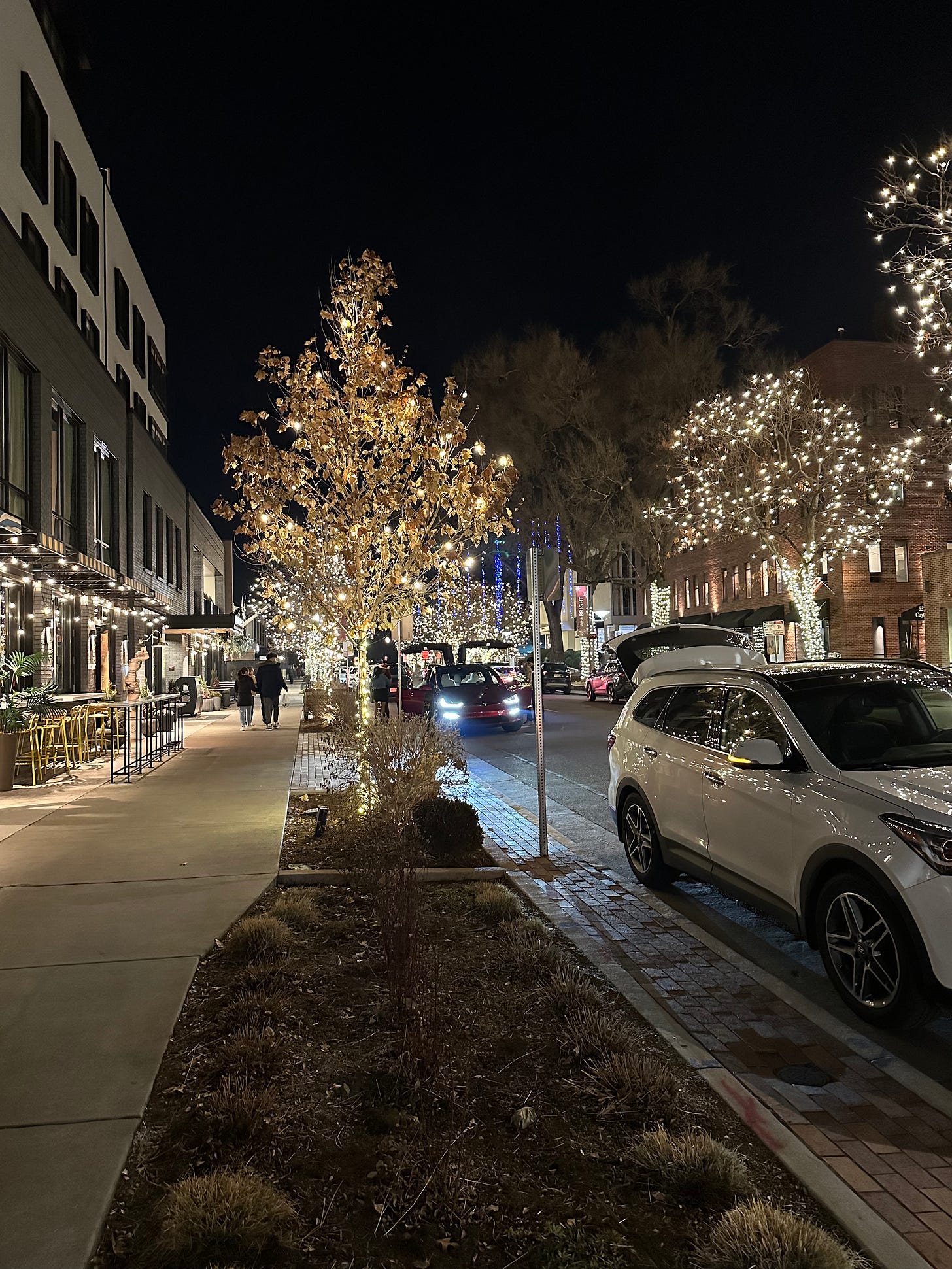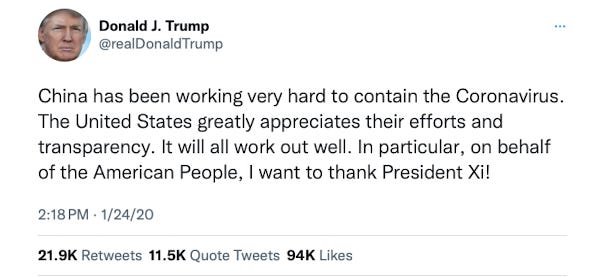A Love Letter from Beijing
...and a gift basket from Riyadh.
Happy Surprise Tuesday Jackal. This will be relatively short because I sent a giant-sized one a little more than a week ago, but I had some stuff itching at my brain. Specifically, I wanted to touch on a big news story (that has already faded from the headlines!) while also revisiting some of the arguments about Donald Trump’s disqualification. Let’s dive in.
Why is your headline so weird?
Last week, House Republicans finally scored their big fish, releasing a pretty damning report: President Joe Biden has received $7.8 million from foreign countries, including China, Qatar, Saudi Arabia, United Arab Emirates, and India. The overwhelming majority of it comes from China ($5.6 million), just as they have been alleging for years. Although these funds were paid to a private company, it is nonetheless damning and they make a compelling argument that Joe Biden is compromised.
Just kidding! House Democrats actually released a report to this effect about Donald Trump. Meanwhile, House Republicans are making serious headway tracking down a $4K loan Joe Biden gave to Hunter Biden for a car.
The report itself (PDF warning) is seriously amazing. What I said above is true; China visited Trump’s properties and spent almost $6 million in the process.
Jonathan Chait has a great piece on this hilarity:
This serves as another illustration of what I have come to see as the iron law of Trump scandals: Anything a Trump opponent may do, Trump will do worse. […] Trump himself has stated in public that he tracks how much foreign countries spend on his business and adjusts his view of those countries accordingly. “Saudi Arabia, I get along great with all of them,” he announced at a 2015 rally. “They buy apartments from me. They spend $40 million, $50 million. Am I supposed to dislike them? I like them very much!”
We should be clear: These are not Chinese nationals or Chinese businessmen, i.e., the kinds of people usually involved in Hunter Biden’s (shady) deals. This is the government of China spending money at Donald Trump’s hotels while he is the President. That whizzing sound you hear is the air slowly coming out of the Joe Biden impeachment balloon.
I want to quickly touch on another aspect of this, and it is related to CHINA (Trump pronunciation). A lot of people on the Right live in this reality that Trump was actually very tough on China, and Biden is, in fact, very weak.
It couldn’t be further from the truth. Biden’s current policies are, more or less, a continuation of Barack Obama’s strategy to isolate China, which they sought to achieve through a little trade agreement called the Trans-Pacific Partnership (TPP). Its subtle goal, in short, was to isolate China from other Asian trade partners and build closer relationships with the latter.
Bernie Sanders opposed it because he perceived it to be bad for Union workers (he is also against Free Trade). But Trump opposed it because….reasons. I am assuming he did so because President Obama initiated it, but given the lucrative deals he has been getting from China since nixing it, I don’t think anything is out of the question.1
But a long forgotten portion of Trump’s Presidency is the lead-up to COVID’s emergence in America. As we all know, COVID popped up in China in late 2019, but alarm bells in the West didn’t start ringing until early 2020. When Trump was being asked about it, he repeatedly praised Xi Jinping and said China had COVID under control. Here is Trump on January 24, 2020:
On February 7, 2020, he said:
I just spoke to President Xi last night, and, you know, we’re working on the — the problem, the virus. It’s a — it’s a very tough situation. But I think he’s going to handle it. I think he’s handled it really well. We’re helping wherever we can.
These two tweets from that day are also pretty wild:
On February 10, 2020, he said this:
I think China is very, you know, professionally run in the sense that they have everything under control,” Trump said. “I really believe they are going to have it under control fairly soon. You know in April, supposedly, it dies with the hotter weather. And that’s a beautiful date to look forward to. But China I can tell you is working very hard.
Here he is again on the 23rd:
I think President Xi is working very, very hard. I spoke to him. He’s working very hard. I think he’s doing a very good job. It’s a big problem. But President Xi loves his country. He’s working very hard to solve the problem, and he will solve the problem. OK?
Then on the 27th he just repeated Xi’s nonsense:
I spoke with President Xi. We had a great talk. He’s working very hard, I have to say. He’s working very, very hard. And if you can count on the reports coming out of China, that spread has gone down quite a bit. The infection seems to have gone down over the last two days. As opposed to getting larger, it’s actually gotten smaller.2
Does that sound like someone who is tough on China, or does it sound like Trump being nice to an autocrat who was sending people to Trump Hotels? Relatedly, guess who openly called Xi a dictator, visibly frustrating his Secretary of State? Joe Biden. That might be why China is pretty much openly saying that their preferred candidate is Donald Trump.
Is every accusation with Trump an admission? It’s hard to tell sometimes, but it sure seems like it.
Some more 14th Amendment stuff.
As a preliminary matter, I’ll link to my piece on Trump’s disqualification here, and advise you to read it, otherwise this section will sound like Slipknot singing in Elvish (which might just be normal Slipknot).
Another (much shorter!) article on the subject was posted this week in Brigham Young University’s law review. The authors - James Heilpern and Michael T. Worley - agree with the argument that Trump is disqualified.
Heilpern and Worley had a more singular focus: They went through newspapers from 1850-1870 and found lots of evidence that “officers” of the United States were elected, and therefore the President was considered an “Officer” of the United States for the purposes of Section 3. When applying that to Trump, then it is obvious he is disqualified. Josh Blackman responds to them here.3
I have to say, the more I munch on this argument the more grainy it gets. In his response, Blackman says this:
First, the Authors conclude, based on a corpus linguistics search, that the phrase "Officers of the United States" is not a historical term of art. In a footnote, they write, "While Blackman and Tillman never make this assertion explicitly, it is implicit in their arguments." Their claim, here, is more than odd. Why? Because we, in fact, expressly state the exact opposite (original emphasis).
This doesn’t make sense. If the President isn’t an “officer of the United States,” then the phrase would have to be a “term of art,” because the plain meaning of “officer of the United States” would encompass the Presidency.
Here is my other thing with Blackman: He omits or leaves out certain things that do not help his argument. For instance, in the piece I linked to in my previous Jackal, Blackman says this:
There is a recent Supreme Court opinion discussing the scope of the Constitution's "Officers of the United States"-language. In Free Enter. Fund v. Pub. Co. Accounting Oversight Bd. (2010), Chief Justice Roberts observed that "[t]he people do not vote for the 'Officers of the United States.'" Rather, "officers of the United States" are appointed exclusively pursuant to Article II, Section 2 procedures. It follows that the President, who is an elected official, is not an "officer of the United States."
Blackman makes it seem like Roberts is sympathetic to the argument that the President is not an officer of the United States, but Roberts never gives a hint either way. Then, he later quotes James Madison in a way that undermines Blackman’s point:
The diffusion of power carries with it a diffusion of accountability. The people do not vote for the “Officers of the United States.” Art. II, §2, cl. 2. They instead look to the President to guide the “assistants or deputies … subject to his superintendence.” The Federalist No. 72, p. 487 (J. Cooke ed. 1961) (A. Hamilton). Without a clear and effective chain of command, the public cannot “determine on whom the blame or the punishment of a pernicious measure, or series of pernicious measures ought really to fall.” Id., No. 70, at 476 (same). That is why the Framers sought to ensure that “those who are employed in the execution of the law will be in their proper situation, and the chain of dependence be preserved; the lowest officers, the middle grade, and the highest, will depend, as they ought, on the President, and the President on the community.” 1 Annals of Cong., at 499 (J. Madison).
In that ending, Madison is laying out the tiers of officers in the United States, and when I follow it logically, it seems like Madison is trying to include the President as an officer. He goes:
The lowest.
The middle grade.
The highest.
The President.
The lower officers are dependent on the President, and the President as the highest officer, is dependent on the voters. Here, Madison is making a case for accountability, and he outlines that the President does, indeed, have accountability.
And here is the death blow, and it comes from (my name is) Alexander Hamilton. In Federalist 69, Hamilton echoes Madison’s sentiment that the President is an officer, and that as the highest officer, he is held accountable by the people. We know this because Hamilton explicitly says this:
The President of the United States would be an officer elected by the people for FOUR years.
One more on Blackman. He also says in the piece above that they cited an amicus brief (a supportive argument written by a “friend of the court” who is not a direct party to the case) in the Lucia v. SEC decision. But here is what Clarence Thomas says in his concurrence:
The Founders likely understood the term “Officers of the United States” to encompass all federal civil officials who perform an ongoing, statutory duty—no matter how important or significant the duty. See Mascott 454. “Officers of the United States” was probably not a term of art that the Constitution used to signify some special type of official. Based on how the Founders used it and similar terms, the phrase “of the United States” was merely a synonym for “federal,” and the word “Office[r]” carried its ordinary meaning (all my emphasis).
I’ll give Blackman this: Thomas gives himself a footnote in the case and says, “I am not making any statements on who is an officer other than in this specific context.” Maybe he is saying that because he buys “the President is not an officer” argument, or because it’s something the court should settle and not use dicta to do so. But the language there does not help the argument at all.
After going through all of this, I don’t think SCOTUS is going to bite.
I will give you another Jackal on Friday to get you into the upcoming three-day weekend, and then return on the 26th. After that, we will have lots of time together, since it’s an election year (OMG). The night dark and full of terrors.
See you Friday.
A fun little reminder: Ivanka Trump’s application for trademarks in China magically got granted after Trump was elected.
His regular co-author, Seth Barrett Tillman, also has writing credits here, but Blackman has the byline so we’ll cite it as Blackman’s piece to make for easier reading.






